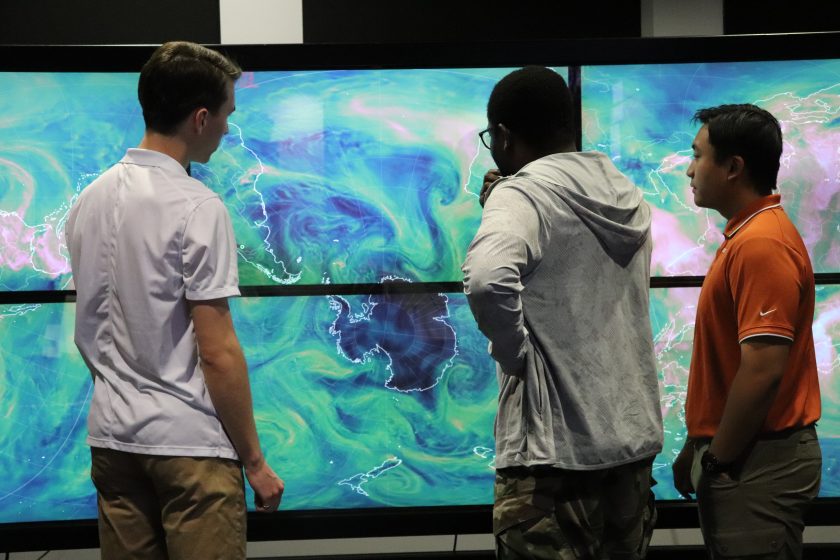Jackson School’s New Climate System Science Bachelor’s Degree Debuting in Fall 2024
March 27, 2024

In order to properly address and further prepare for the far-reaching effects of climate change, the world needs a new generation of scientists who understand exactly how the climate system works.
Starting in the fall, undergraduate students at The University of Texas at Austin will have the opportunity to dedicate their education to that mission. The university’s new Climate System Science major at the Jackson School of Geosciences will prepare students to tackle real-world climate problems and guide decisions at every level of society and the economy.
“By providing undergraduate students the opportunity to learn the climate system at an advanced, quantitative level, we are readying them for a future where they can change the world,” said Claudia Mora, dean of the Jackson School. “Policies needed to successfully address the impacts of climate change must be based in scientific understanding. That knowledge is built by geoscientists who understand the climate system, and can quantify its changes.”
This is the first bachelor’s degree program in the state, and one of few in the country, that emphasizes a scientific study of the climate system. Students will learn about the Earth’s climate from its oceans to its atmosphere, and will develop the research and computational skills needed to collect, analyze and predict climate data. They will also learn the foundational geoscience concepts that support more advanced courses.
Danny Stockli, chair of the Jackson School’s Department of Earth and Planetary Sciences, said that it has become a priority in the department to educate students to understand and tackle the wide-ranging challenges related to the impact of climate change and extreme weather events.
“We need to educate climate scientists for the workforce to lead and contribute to finding solutions to a plethora of issues such as heat, drought, hurricanes, water supply and sea level rise, and impacting human health, water resources, coastal resilience, and urban planning,” Stockli said. “It’s our job to educate scientists who understand the challenges and can work on solutions to mitigate the impact of climate change and extreme weather events.”
Across the public, private, and nonprofit sectors, climate scientists are in high demand. Organizations need more scientists equipped to analyze climate data, assess risk, and make recommendations as the effects of climate change intensify. For example, as hazards such as floods, wildfires, and hurricanes occur with increasing frequency, insurance companies have had to rely on the counsel of climate scientists as they change their policies and prices to reflect the risk they are taking on. Industries such as public health, environmental law, public policy, banking and finance are among those taking on climate scientists as well.
Graduates of this program will also be prepared to pursue an advanced degree in subjects such as atmospheric science, oceanography, glaciology, and climate science.
The climate system science degree program is distinct from an environmental science or sustainability degree because it is wholly focused on the science of climate and climate change, said Professor Kerry Cook, who helped build this degree program.
“Coursework associated with the climate degree brings students to a high technical level in math and science while, at the same time, it develops the breadth needed to understand the components of the climate system — atmosphere, oceans, cryosphere, biosphere, and lithosphere,” she said. “Also built into the major is coursework that teaches the computer skills needed to handle and extract knowledge from large data sets, such as those generated in Earth observation.”
Jackson School Professor Zong-Liang Yang said that by majoring in climate system science, students can gain the skills needed to help address complex climate challenges.
“By enrolling in this degree program, students can make a tangible impact by contributing to innovative solutions and advancing our understanding of climate dynamics,” he said. “I’m proud that the Jackson School is leading the way in preparing the next generation of climate scientists and leaders.”
The Jackson School is one of the largest geosciences programs in the world and a leader in climate systems research. Climate faculty at the Department of Earth and Planetary Sciences, Bureau of Economic Geology, and Institute for Geophysics represent expertise in every sphere of the climate system, from the local to the global scale.
Students interested in enrolling in the degree program can find more information at jsg.utexas.edu/climate-degree
